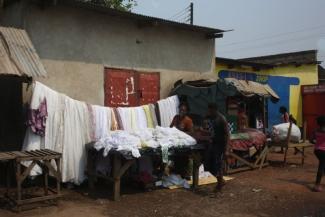African Union-European Union Summit
Give civil society more space
 sb
sb
Civil society was given precious little space at the AU-EU summit. A parallel event called “Forum Citoyen Afrique-Europe” was broken up by local police, without any reasons being given, one day before the start of the official summit. The alternative citizen forum had been scheduled to start earlier, with MISEREOR contributing to its organisation. It was supposed to draft policy recommendations for fair and inclusive cooperation between Europe and Africa on such urgent matters as youth unemployment, migration, trade relations, land rights, agriculture, fisheries and climate change. The alternative conference had convened more than 500 delegates from 16 African and seven European countries.
The forced break-up prevented forum participants from submitting their proposals to the official summit. It was a sobering symbol of the lack of a role for civil society in shaping sustainable cooperation between Africa and the EU.
The official summit was dominated by reports of slave trading in Libya. Media coverage of the event focused primarily on a plan to evacuate 3,800 refugees victimised by this dehumanising business in Libya and return them to countries like Chad and Niger. Such an evacuation would certainly have symbolical relevance, but it would be even more important to address the problem’s underlying systemic issues. In recent months, the EU’s anti-migration policy did much to worsen refugees’ human-rights situation as stricter EU border controls frequently force migrants onto ever more dangerous routes.
The debate on flight and migration is primarily driven by European self-interest, yet innovative solutions are needed to tackle the summit’s chosen topic: sustainable prospects for youth. Sixty percent of Africans are younger than 25. The majority of them still have no access to education or vocational training and thus lack long-term prospects. Africa’s population, which today stands at 1.2 billion people, is expected to double by the year 2050. Creating long-term opportunities for young people will require a complete revision of EU-Africa relations. Local economies must be stimulated and vocational education promoted.
Agreements between EU members and African countries are still shaped by European self-interest. In particular, the existing Economic Partnership Agreements (EPAs) benefit strong actors like Germany, whereas African countries benefit less or not at all. For instance, smallholder farmers are crowded out of local markets in many places because of cheap food imports from the EU. They include powdered milk, tomato paste, poultry or pork. Poor people’s livelihoods are being destroyed.
In light of high youth unemployment in Africa, investments will only create jobs if they simultaneously improve the quality of education and vocational training. Moreover, education and vocational training must correspond to local labour-market demand. In addition to promoting local businesses, craftspeople and shops, investors must also take into account the informal sector, which employs 84 % of the labour force. Last but not least, investors must help to ensure that human rights and environmental standards are upheld.
All summed up, neither African economies nor the outlook of the continent’s youth will improve significantly as long as the EU-AU relations prioritise European interests, such as migration control and exports. Civil-society involvement must be institutionalised for the consideration of young people’s potential and perspectives of young people to be guaranteed long term.
Maria Klatte directs the Africa and Middle East Department at MISEREOR, a Catholic charity based in Aachen.
maria.klatte@misereor.de



